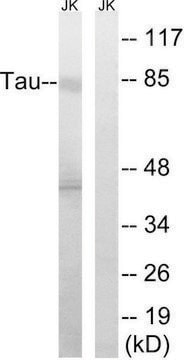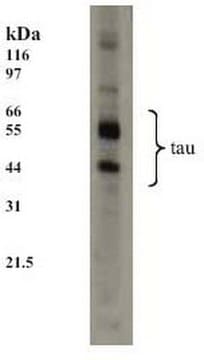SAB5500182
Anti-TAU antibody, Rabbit monoclonal
recombinant, expressed in proprietary host, clone SP70, affinity isolated antibody
Synonym(s):
Anti-DDPAC, Anti-FTDP-17, Anti-MAPTL, Anti-MSTD, Anti-MTBT1, Anti-MTBT2, Anti-PPND, Anti-PPP1R103, Anti-TAU, Anti-tau-40
About This Item
Recommended Products
biological source
rabbit
Quality Level
recombinant
expressed in proprietary host
conjugate
unconjugated
antibody form
affinity isolated antibody
antibody product type
primary antibodies
clone
SP70, monoclonal
species reactivity
human (tested)
technique(s)
flow cytometry: 1:100
immunohistochemistry: 1:100
isotype
IgG
UniProt accession no.
shipped in
wet ice
storage temp.
2-8°C
target post-translational modification
unmodified
Gene Information
human ... MAPT(4137)
General description
Immunogen
Features and Benefits
Physical form
Disclaimer
Not finding the right product?
Try our Product Selector Tool.
Storage Class Code
10 - Combustible liquids
WGK
WGK 2
Flash Point(F)
Not applicable
Flash Point(C)
Not applicable
Certificates of Analysis (COA)
Search for Certificates of Analysis (COA) by entering the products Lot/Batch Number. Lot and Batch Numbers can be found on a product’s label following the words ‘Lot’ or ‘Batch’.
Already Own This Product?
Find documentation for the products that you have recently purchased in the Document Library.
Customers Also Viewed
Our team of scientists has experience in all areas of research including Life Science, Material Science, Chemical Synthesis, Chromatography, Analytical and many others.
Contact Technical Service







